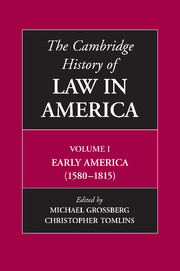Book contents
- Frontmatter
- 1 Law, Colonization, Legitimation, and the European Background
- 2 The Law of Native Americans, to 1815
- 3 English Settlement and Local Governance
- 4 Legal Communications and Imperial Governance: British North America and Spanish America Compared
- 5 Regionalism in Early American Law
- 6 Penality and the Colonial Project: Crime, Punishment, and the Regulation of Morals in Early America
- 7 Law, Population, Labor
- 8 The Fragmented Laws of Slavery in the Colonial and Revolutionary Eras
- 9 The Transformation of Domestic Law
- 10 Law and Religion in Colonial America
- 11 The Transformation of Law and Economy in Early America
- 12 Law and Commerce, 1580–1815
- 13 Law and the Origins of the American Revolution
- 14 Confederation and Constitution
- 15 The Consolidation of the Early Federal System, 1791–1812
- 16 Magistrates, Common Law Lawyers, Legislators: The Three Legal Systems of British America
- Bibliographic Essays
- Notes on Contributors
- Index
- References
15 - The Consolidation of the Early Federal System, 1791–1812
Published online by Cambridge University Press: 28 November 2008
- Frontmatter
- 1 Law, Colonization, Legitimation, and the European Background
- 2 The Law of Native Americans, to 1815
- 3 English Settlement and Local Governance
- 4 Legal Communications and Imperial Governance: British North America and Spanish America Compared
- 5 Regionalism in Early American Law
- 6 Penality and the Colonial Project: Crime, Punishment, and the Regulation of Morals in Early America
- 7 Law, Population, Labor
- 8 The Fragmented Laws of Slavery in the Colonial and Revolutionary Eras
- 9 The Transformation of Domestic Law
- 10 Law and Religion in Colonial America
- 11 The Transformation of Law and Economy in Early America
- 12 Law and Commerce, 1580–1815
- 13 Law and the Origins of the American Revolution
- 14 Confederation and Constitution
- 15 The Consolidation of the Early Federal System, 1791–1812
- 16 Magistrates, Common Law Lawyers, Legislators: The Three Legal Systems of British America
- Bibliographic Essays
- Notes on Contributors
- Index
- References
Summary
To celebrate the ratification of the new Federal Constitution, Federalist Francis Hopkinson composed “The Raising: A New Song for Federal Mechanics.” In one verse he exhorted America’s artisans to rally to the Constitution’s standard. In Hopkinson’s musical ode, citizens mustered with their tools, not muskets.
COME muster, my lads, your mechanical tools,
Your saws and your axes, your hammers and rules;
Bring your mallets and planes, your level and line,
And plenty of pins of American pine:
For our roof we will raise, and our song still shall be
Our Government firm, and our citizens free.
Hopkinson also helped stage Philadelphia’s elaborate procession in honor of the Constitution. As many as 5,000 marchers representing the city’s many trades, professions, and different religious denominations assembled to demonstrate their support. Similar but less elaborate parades and celebrations occurred in other cities and towns. These carefully staged rituals were designed to symbolize harmony and promote consensus in the wake of the sometimes bitter ratification debates. Although these public displays of consensus never managed to obliterate fully the lingering traces of Anti-Federalist antagonism and suspicion, the rapid acceptance of the Constitution was nothing short of remarkable given the rancor of the ratification process. Even in Rhode Island, a strongly Anti-Federalist state that would not ratify the Constitution for almost two years, the new language of American constitutionalism permeated public discourse. Thus, one commentator observed that in Rhode Island “every friend of liberty” was “putting on the appearance of Federalism.”
- Type
- Chapter
- Information
- The Cambridge History of Law in America , pp. 518 - 554Publisher: Cambridge University PressPrint publication year: 2008

